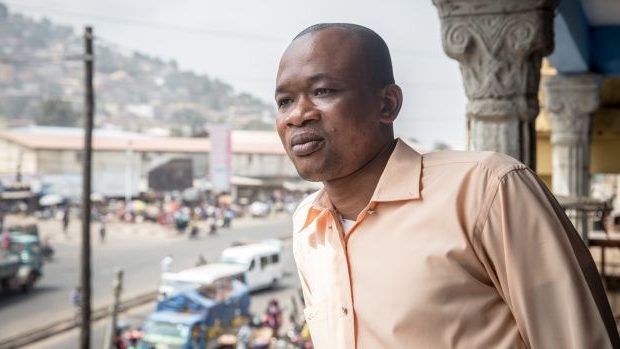On 12-11-2020, the government of Sierra Leone through the ministry of social welfare gives a re-integration package to one hundred migrants.
Including some of the 85 migrants, and currently, 15 of the 85 are on business training which in no time are to be re-integrated by INTERNATIONAL ORGANIZATION FOR MIGRATION (IOM).
All this is because of ANAIM relentless Advocacy. Special thanks to the director Sheku Bangura for his persistent effort to see that migrants achieve their dreams and the entire volunteers of Advocacy Network Against Irregular Migration ANAIM.
See the link below for pictures and videos and other relevant information
On the 7 of August 2020, International Organization for Migration IOM support ANAIM with a computer laptop, printer and a modem.
The entire staff of ANAIM extend our appreciation to the IOM regional office in Senegal Dakar and also the IOM team in Sierra Leone.
For more information see the link below
The Secretary General for Advocacy Network Against Irregular migration was on Air Radio today 07- October-2020, to discuss the Topic: Health Care for Pregnant women and children Saves lives and keeps families strong.
Freetown ANAIM migrants as Messengers ends their three days community Led Action training CLA on COVID19, we’re trained as a community to mobilize, by engaging our different communities to know their perspectives on how to mitigate COVID19 in our communities. Basically, we are going into our different communities to tap from their idea on what they think we should do as a community to mitigate the spread; the virus
Our effort in the fight against human trafficking continues!
Recently our Director, Mr. Sheku Bangura delivered a statement on the occasion marking the end of one of WHI’s projects on human trafficking.
The event also attracted key stakeholders from the Ministry of Labour and Social Security, Sierra Leone Labour Congress, and the European Union.
Some returnees and members of ANAIM today joined the Government of Sierra Leone and development partners including IOM to celebrate the International Women’s Day and also to witness the launch of the Male Involvement Strategy by the Ministry of Gender Affairs in Kambia Town
See the link below for more information and pictures
ANAIM Partners including IOM to celebrate the International Women’s Day
Assignment
Sierra Leone: The price of going home
Released On: 14 Nov 2019
What happens to migrants who give up trying to reach Europe – and go home as failures?
Stories:
‘We failed to reach Europe – now our families disown us’
By Tim Whewell
BBC World Service
14 November 2019
The above two reports by the BBC world service are the most current activities undertaken by Sheku. Prior to that there were interviews and documented evidence of returnees that were later used to advise another would-be migrant of the dangers of irregular migration.
For more information listen to the soundtrack from BBC world service
On the 22 May 2020  Eight five returnees (85 )from Kuwait tested positive for the coronavirus while in Kuwait they were tested negative but Sierra Leone was positive
These people were sent to treatment centers and after 3 weeks they were retested all of them discharge with certificates but the community rejected them because of the fear of still having the virus
There was a young girl that was beaten by her foster mother, her waist was broken and all her two feet were also broken. Mr. Lansana Sacco called me and shared the video of this child and asked me to look for her everywhere in the country. I went to the hospital which was Connaught and asked for children’s words they directed me and I was asked for Amie Kabinah the nurses told me she has been discharged yesterday then I was referred to Don Bosco but unfortunately, I could not find her there I had to return back to the hospital where I was given two phone numbers, the one was the uncle and another one was the Aunt I called the Uncle his phone was off then I tried the Aunt and she answered my called.
I made a trip to go and see this child in Bo. I went there they told me that she stayed in one village for traditional medication. I went further to that particular village to see her I met her there, her condition was not favorable food to eat is not easy she can’t even push the wheelchair because of lots of stones and holes in the village.
Mr. Saccoh has to set up a GoFundMe account where many humanitarian donates money for her.
The total amount of the money was 1,048usd in Leone’s about 9,800,0000 nine million and eight hundred thousand Leone’s
That was the money I presented to the family of Amie Kabeneh.
In my presentations, stakeholders of the community were present there like the Paramount Chief the family of Amie Kabeneh, and Lansana Saccoh Family
Photos and videos below are some of my presentations
For information see the pictures and videos below
https://www.facebook.com/Advocacy-Network-Against-Irregular-Migration-ANAIM-285669002020002/photos/pcb.526853794568187/526853101234923/
https://www.facebook.com/Advocacy-Network-Against-Irregular-Migration-ANAIM-285669002020002/photos/pcb.526853794568187/526853101234923
Advocacy Network Against Irregular Migration in collaboration with WORLD HOPE INTERNATIONAL provides a start-up business for returnees who are not entailed in the IOM Reintegration package
See the link below for more information
https://www.facebook.com/Advocacy-Network-Against-Irregular-Migration-ANAIM-285669002020002/photos/pcb.526838834569683/526838641236369
https://www.facebook.com/Advocacy-Network-Against-Irregular-Migration-ANAIM 285669002020002/photos/pcb.526838834569683/526838641236369
Celebrating the International
https://www.facebook.com/hashtag/migrantsday2019?__eep__=6&__cft__%5b0%5d=AZWU-5gZKYxmAXHhkzD2jTo1rRldspAJJK7GzxmTGMs4tFEsnH3sfseweqpeskyDD4Kd2TYoZeHN09OAtEVAsi6VLKzae6tYqv5LVwi0ocCVcxXQuVgjfHAiuaIyJQ1qY_3rGNqMj52wbPHOboFC1NqL45xbSBbPw-DdnDkcxJu6Pg&__tn__=*NK-R”>#MigrantsDay2019
with the IOM at Victoria Park in Freetown for information see the link below
https://www.facebook.com/Advocacy-Network-Against-Irregular-Migration-ANAIM-285669002020002
https://www.facebook.com/Advocacy-Network-Against-Irregular-Migration-ANAIM-285669002020002
IOM international staff came and visited our office and asked a series of questions about our thematic areas of operations. It was fruitful and she was delighted to meet people like us working for three years without salary but still, we have the courage
and passion to spread and expose the huddle of irregular migration through awareness-raising
For more information see the link below
https://www.facebook.com/Advocacy-Network-Against-Irregular-Migration-ANAIM-285669002020002/photos/pcb.523256828261217/523256621594571/
https://www.facebook.com/Advocacy-Network-Against-Irregular-Migration-ANAIM-285669002020002/photos/pcb.523256828261217/523256621594571/
MR.SHEKU BANGURA THE FOUNDER AND DIRECTOR OF ADVOCACY NETWORK AGAINST IRREGULAR MIGRATION (ANAIM)
He’s a succinct humanitarian guru that merits all the accolades in this universe. So I do believe that even the lexical structure of phrases wouldn’t do the way of appraisal for his indomitable work in *Motivating Migrants who have come back home to tell their testimonies and showcase their talent.
Standing for Migrants has been absolutely untainted and I salute your undying energy to motivate and support migrants in diverse ways. For sure you’re an umbrella
Thanks for your love, kindness, support, and generosity.
For what you are doing today is appreciative to man and God
For information see the link below
https://www.facebook.com/285669002020002/photos/a.293784344541801/789947551592142″>https://www.facebook.com/285669002020002/photos/a.293784344541801/789947551592142
The Director of Advocacy Network Against Irregular Migration (ANAIM), Mr. Sheku Bangura is currently in Senegal together with officials of the International Organization for Migration (IOM Sierra Leone) to attend a 4-day workshop with regards to the new Migrants as Messengers Project.
The workshop which started on the 25th of February will end on the 28th of February 2020.
This event is an opportunity for the Director of ANAIM to network, share experiences and learn best practices with other Migrants from other West African countries that are part of the MaM Phase 2 project.
Knowledge gained in this workshop will be cascaded to other Volunteer Field officers( VFOs) of the MaM project in Sierra Leone.
For more information and pictures and videos see the link below
https://www.facebook.com/Advocacy-Network-Against-Irregular-Migration-ANAIM-285669002020002/photos/pcb.569726950280871/569726436947589
https://www.facebook.com/Advocacy-Network-Against-Irregular-Migration-ANAIM-285669002020002/photos/pcb.569726950280871/569726436947589
On 31st January, a group of returned migrants from 8 districts in Sierra Leone gathered in Freetown to discuss how they can contribute to addressing irregular migration in the country.
45 returnees through the Migrants as Messengers (MaM) project will share their stories with communities and families across Sierra Leone to generate awareness of the dangers of irregular migration
For more information see the link below https://www.facebook.com/iomsierraleone/photos/pcb.3407372242666872/3407292596008170/
RETURNED MIGRANTS STORIES
We failed to reach Europe – now our families disown us’
By Tim Whewell
BBC World Service
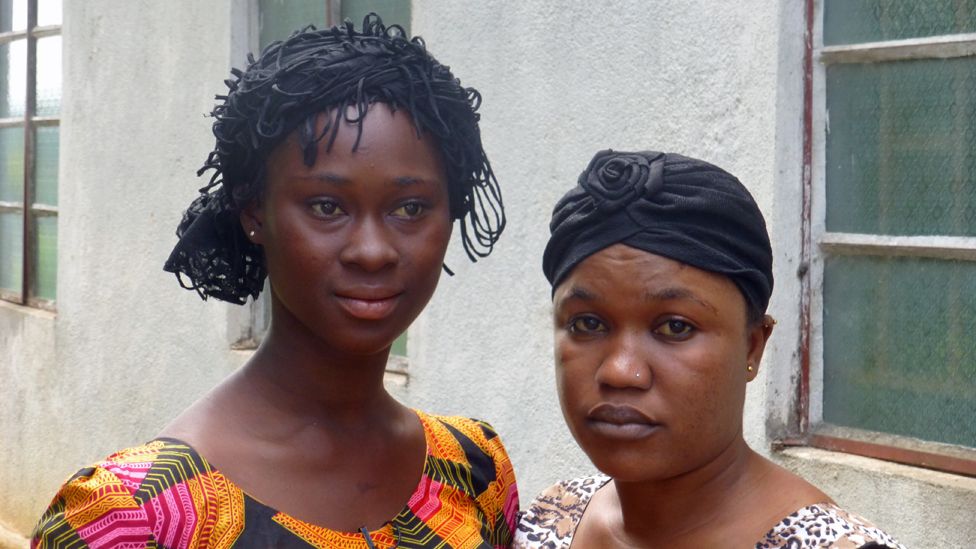
Most of the West African migrants who fail to reach Europe eventually return to their own countries, but it can be a bitter homecoming. In Sierra Leone, returnees are often rejected by relatives and friends. They’re seen as failures, and many stole from their families to pay for their journey.
Some readers will find this story disturbing
Fatmata breaks into sobs when she remembers the six months she spent in slavery as the “wife” of a Tuareg nomad who seized her in the Sahara desert.
“They call him Ahmed. He was so huge and so wicked,” she says. “He said, ‘You are a slave, you are black. You people are from hell.’ He told me when somebody has a slave, you can do whatever you want to do. Not only him. Sometimes he would tell his friend, ‘You can have a taste of anything inside my house.’ They tortured me every day.”
That was only the beginning of the horrors Fatmata, aged 28, from Freetown, Sierra Leone, experienced as she tried to cross West Africa to the Mediterranean. She eventually escaped from Ahmed, but was recaptured by traffickers who held her in their own private jail in Algeria.
After she and other migrants broke out, Fatmata, deeply traumatised, decided to abandon her dreams of a new life in Europe – and go back to where she started. She applied to an intergovernmental agency, the International Organisation for Migration (IOM), which pays the fares for migrants who want to return home.
Last December, she arrived back in Freetown, by bus from Mali – after nearly two years away. But there were no emotional reunions, no welcomes, no embraces. Nearly a year later, Fatmata hasn’t even seen her mother – or the daughter, now eight, she left behind.
“I was so happy to come back,” she says. “But I wish I had not.”

Find out more
Listen to Sierra Leone – the price of going home on Assignment, on the BBC World Service

When she got back, she called her brother. But his reaction terrified her. “He told me, ‘You should not even have come home. You should just die where you went, because you didn’t bring anything back home.'”
After that, she says, “I didn’t have the heart to go and see my mother.”
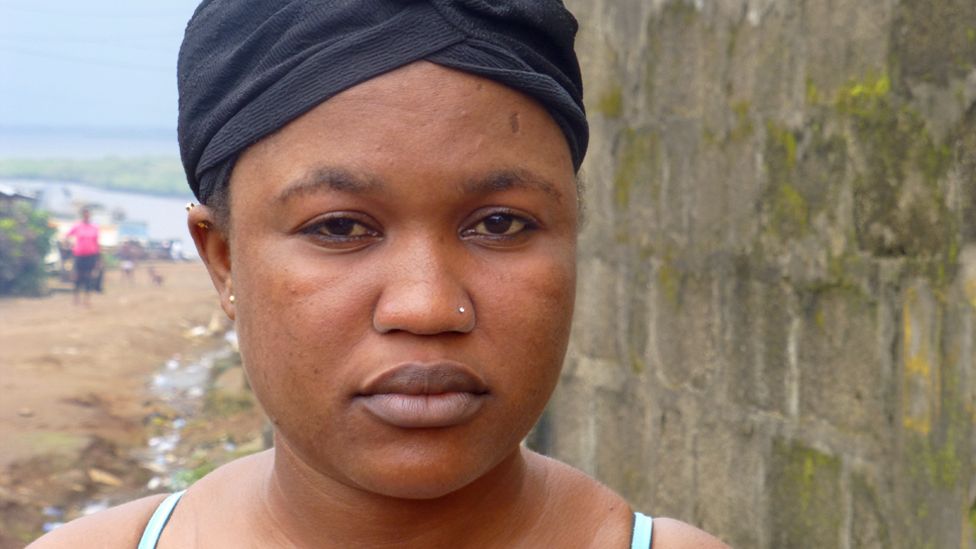
But her family didn’t reject her just because she was a failure. It was also because of how she funded her journey.
She stole 25 million leones – about US $2,600 at today’s exchange rate, but then worth a lot more – from her aunt. It was money her aunt had given her to buy clothes, that could then be resold as part of her trading business. Her aunt regularly trusted her in that way.
“I was only thinking how to get the money and go,” Fatmata says, though she adds that she’s not a selfish person. “If I had succeeded in going to Europe, I decided that I would triple the money, I would take good care of my aunt and my mum.”
But Fatmata’s aunt’s business never recovered from the loss of the money. And – to make things even worse – the theft has caused a rift between the aunt and her sister, Fatmata’s mother, whom she falsely accuses of being in on Fatmata’s plan.
“I’m in pain, serious pain!” her mother says, when I visit her. “The day I set eyes on Fatmata, she will end up in the police station – and I will die.”
It’s a story that’s repeated in the families of many of the 3,000 or so Sierra Leoneans who have returned in the last two years after failing to reach Europe.
At one time, relatives often raised the money to send someone, but there’s less willingness to do that now that stories of imprisonment and death along the route have multiplied. Now, many would-be migrants keep their plans secret, and take whatever money they can, sometimes even selling the title deeds to the family land.
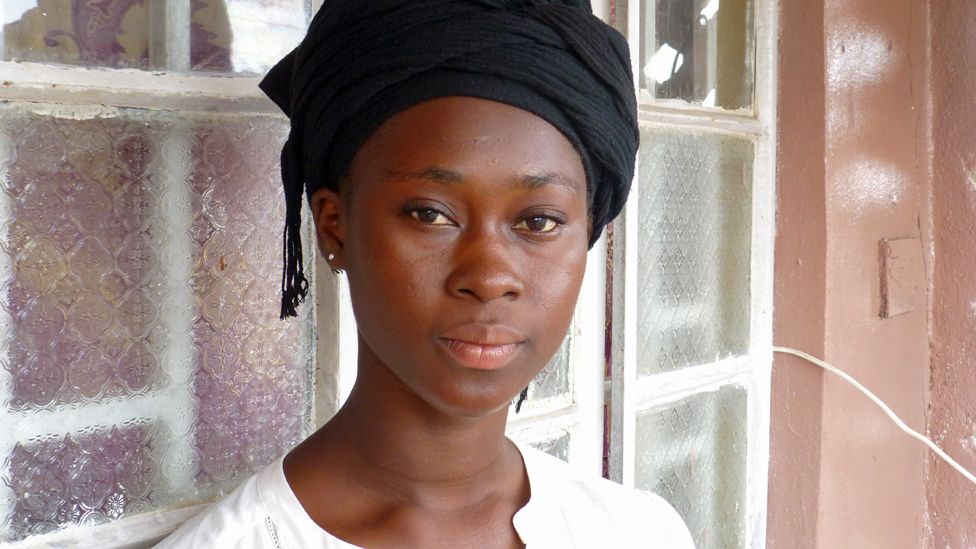
At the headquarters of the Advocacy Network Against Irregular Migration, a voluntary group that helps returned migrants rebuild their lives, all the returnees I meet have stolen from their families.
Jamilatu, aged 21, who escaped with Fatmata from the traffickers’ prison in Algeria, took a plastic bag of cash worth $3,500 from her mother’s room when she was out of the house. The money didn’t even belong to her mother. It had all been lent to her by neighbours, as part of a microcredit scheme.
After Jamilatu left, the furious creditors besieged her mother’s house, threatening to kill her if she didn’t return the money. She was forced to flee Freetown for Bo, three hours away in the south of the country, leaving her three other children behind with their father.
“My mum doesn’t want to talk to me, because of the money,” Jamilatu says. “So since I came back, I haven’t seen her. And I want to see my mum – it’s over two years now that I’m not seeing her.”
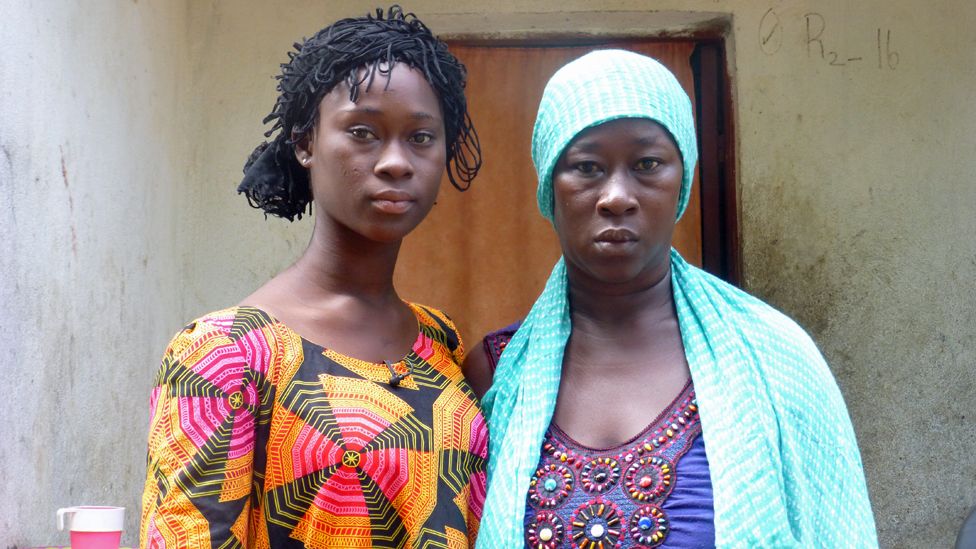
I visit her mother, Maryatu, at her new home in Bo, and after a long conversation she says she would like to see Jamilatu again, despite the suffering she’s caused.
But when they meet, soon afterwards, it’s a short, awkward and almost silent reunion. They embrace stiffly. Then Jamilatu kneels in front of her, asking for forgiveness. Neither looks the other in the eye.
Afterwards, Jamilatu goes straight back to Freetown.
“I am the happiest woman on Earth today because I have seen my mum,” she says. But she doesn’t look happy. Her mother has told her they can’t live under the same roof again until Jamilatu has raised the money to repay the creditors.
It’s hard to see how that will be possible. Jamilatu, like Fatmata, has no job. They both depend on support from Advocacy Network Against Irregular Migration. The group was founded by Sheku Bangura, himself a returned migrant, who lobbies the Sierra Leonean government to do more for returnees – currently there’s very little official support – and tries to give practical help himself. He finds accommodation for those who are homeless, intervenes with the police if returnees get into trouble, and organises basic psychological counselling.
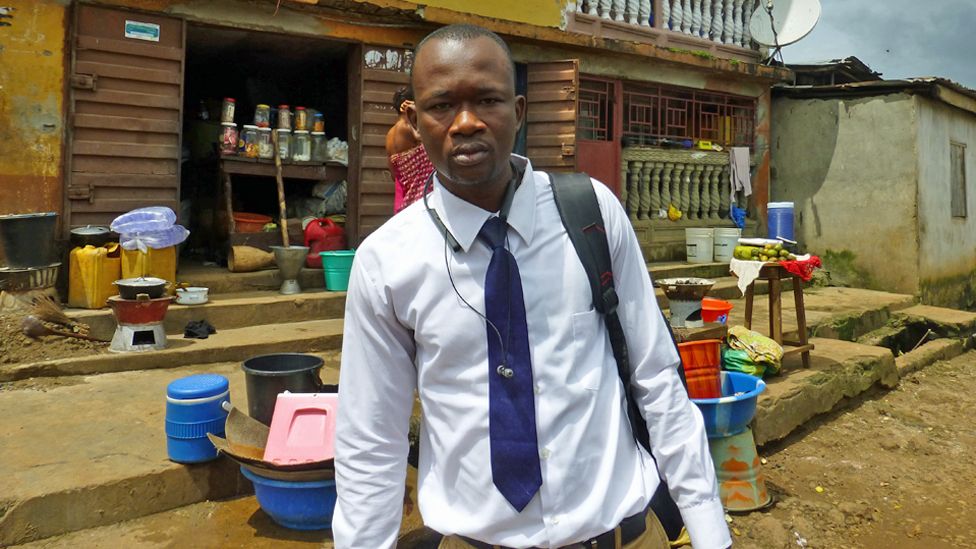
“I have had a lot of migrants who have mental problems,” he says. “These young people, they are on the streets, they don’t have place to sleep. It’s not really easy for them.”
One of those helping out at the Advocacy Network is 31-year-old Alimamy, who set out across the Sahara three years ago, after stealing and selling an expensive water-packaging machine belonging to his uncle.
One of his two travelling companions died of starvation in the desert. The second drowned trying to cross the Mediterranean in a dinghy. Alimamy ended up in a Libyan detention camp. He was only rescued in November 2017 when the IOM began organising flights from Tripoli to West Africa for those who wanted to go home.
Emaciated and exhausted, he accepted the offer of a ticket, but he was terrified of the reception he would get. “I was thinking I should not come back to Sierra Leone, because I know my uncle has a very high temper,” he says.
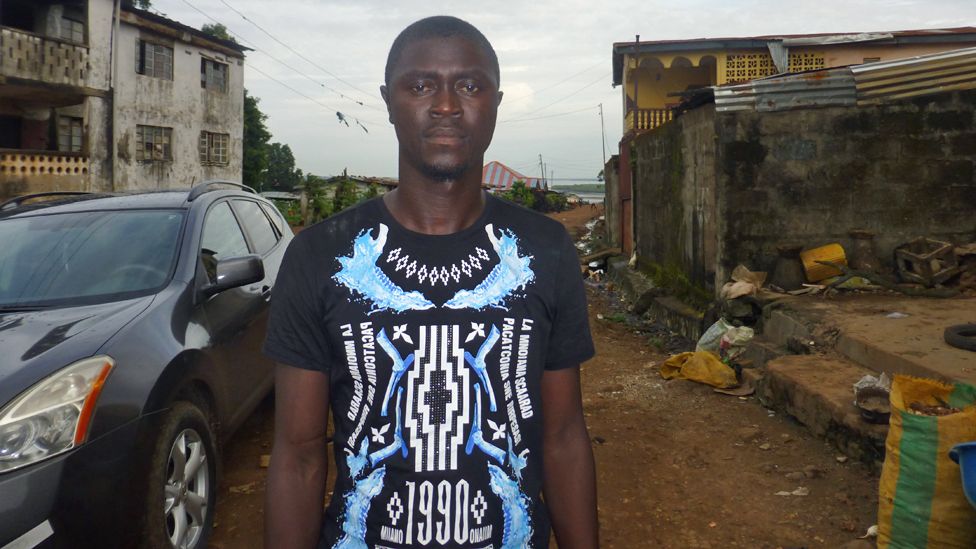
Since returning, Alimamy has lived with friends. His elder brother, Sheik Umar, a former professional footballer, says: “We are hearing he is in Freetown, he is suffering. And yet he hasn’t got the guts to face any of us in the family.”
Sheik Umar says he used to be close to his brother, but if he sees him now, he will ensure he is “arrested, prosecuted and convicted”.
“If he dies in prison, I will not have any regrets, I am sure no family members will have regret, because of the shame he has put on all of us.”
He says the water-packaging business Alimamy had been entrusted to run by his uncle could have generated enough money to support the whole family.
“But he misused that opportunity and all of us are in this mess now… Wherever I go now, people taunt me. Our mother is sick, she has moved to a village. That (business) was the beginning of our hopes. But Alimamy has shattered all of that.”
Alimamy himself is angry and frustrated. “I have come back home, no impact, just like I’m zero,” he says. “The place where I am living, it’s like a hell for me. The way people look at me, I don’t feel happy. They’re looking at me like I’m not human.”
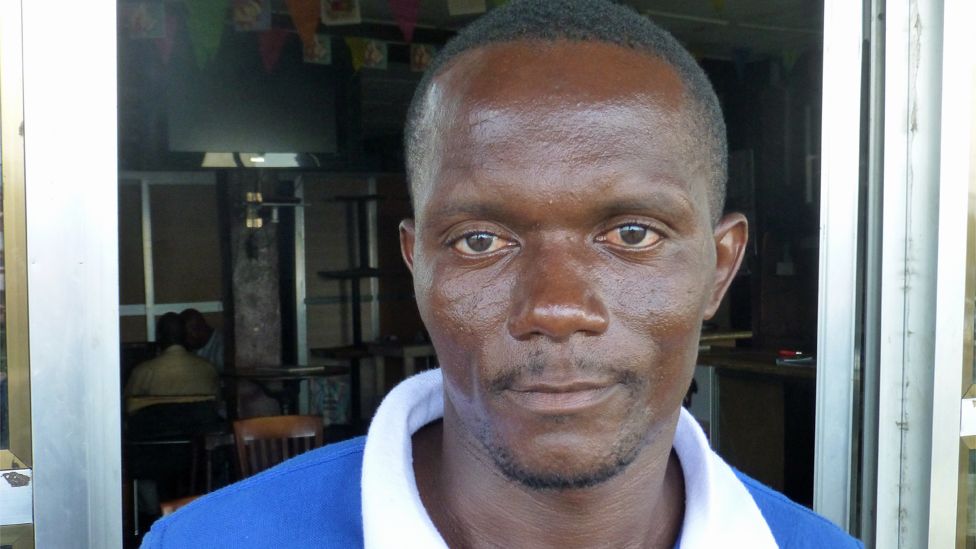
The IOM offers migrants who return voluntarily to their home countries in Africa “re-integration allowances” worth up to 1,500 euros (£1,270). The money comes from a 347m-euro fund financed mainly by the European Union. But the allowances aren’t paid in cash. If they were, most people would just use them to repay their relatives. So the IOM pays for goods or services that applicants can prove they need to set up a specific business.
Alimamy got an allowance to buy a motorcycle to rent out to other drivers to use as a taxi. But after just four months, one of the drivers went off with it and never came back. Alimamy himself had become a victim of theft.
As for Fatmata and Jamilatu, they never received an allowance because they returned from Mali at a time when some other Sierra Leoneans were abusing the system by catching a bus to Mali, pretending they’d returned from across the Sahara, and claiming the allowance. So everyone returning from Mali lost out, including Fatmata and Jamilatu.
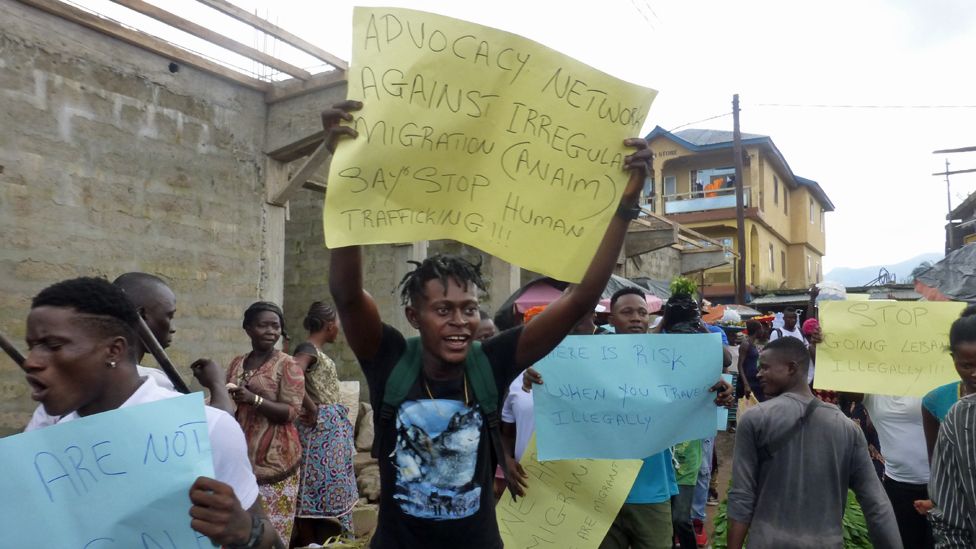
Now, all three returnees take part in “awareness-raising” events organised by the Advocacy Network. They go out on the streets with placards and loudspeakers to warn other young people of the dangers of illegal migration, and urge them to stay in “sweet Sierra Leone”.
But for them, home is no longer sweet. All three are consumed by feelings of worthlessness.
Fatmata says: “I have nothing to offer, I have nothing to show. I can’t even go and see my daughter, I only see the pictures, because I have nothing to give her when I get there, so I can’t.”
Alimamy says the “stigmatisation” he suffers is forcing him to do the opposite of what he says on the streets. He wants to make another attempt to reach Europe.
“Staying here is like a hell for me,” he says. I remind him of the horrors he experienced on his first attempt, being enslaved, imprisoned, and seeing friends die.
Sierra Leonean migrants in Middle East: ‘Some used as sex workers, others as slaves’
Instead of the well-paying jobs they anticipate, many young women are exploited and abused

Fatima, Olivia and Mariatu were easily convinced to travel to the Middle East in the hope of earning money. Photograph: Sally Hayden
When Mariatu ran out of money to keep studying, she made a decision that would change her life. Like many other young women from Sierra Leone, she had heard there were opportunities in the Middle East: employment in shops or restaurants, where she could earn and save significant amounts, before coming back to resume her studies.
Now 25, she travelled to Kuwait in 2018 with a group of other women, some of whom had taken loans to pay for passports and medical checks. Instead of the well-paying job she anticipated, Mariatu was forced to work as a domestic servant for 18 months without pay.
She cleaned, cooked and minded three children, toiling from 6am until midnight, seven days a week. For the first year, she was prohibited from contacting her family. Then she was raped by the man who owned the house. Afterwards, he reported her to the police, accusing her of stealing. She was imprisoned for three months, before being deported to Sierra Leone.
Mariatu arrived back in West Africa in March 2020, right as the coronavirus pandemic was spreading across the world. She was pregnant and her family – already under pressure as lockdowns commenced – ostracised her. Like the other women here, her name has been changed.
She is surviving without government assistance. “We are crying for help,” she said, explaining that she was a virgin before she travelled, and still feels pain looking at the baby in her arms.
Earlier this year, Sierra Leone’s government lifted a two-year ban on labour migration and overseas job recruitment, which was instituted because of the systemic exploitation and abuse of Sierra Leoneans who travelled abroad for work, particularly to the Middle East.
The US government’s 2021 Trafficking in Persons report said the labour migration moratorium had increased citizens’ vulnerability to trafficking by encouraging them to take informal routes abroad. It also found that while Sierra Leone’s government is making efforts to fight trafficking it is still not meeting “the minimum standards… in several key areas”.
 Mariatu, pictured with the baby she gave birth to upon returning to Sierra Leone from Kuwait. Photograph: Sally Hayden
Mariatu, pictured with the baby she gave birth to upon returning to Sierra Leone from Kuwait. Photograph: Sally Hayden
In a year from 2020-2021, the government assisted in the repatriation of 130 Sierra Leoneans from Lebanon by providing travel documents and purchasing airline tickets, as well as the repatriation of 80 Sierra Leoneans from Kuwait. While the government allocated 1 billion Leones (€80,000) towards anti-trafficking efforts in 2020, no funding was reported in 2021.
Activists say many more people from a range of African countries are stranded in the Middle East and need help. The plight of Ethiopian domestic workers in Lebanon, for example, briefly received attention last year when employers began to abandon them at the doors of their consulate in Beirut.
In a small third-floor office in eastern Freetown, more than 100 women gathered to meet me, all of whom had similar tales to tell. They had flown to countries including Oman, Kuwait, Lebanon and Saudi Arabia, persuaded by friends and recruitment agencies, or Sierra Leoneans they encountered online. They were trapped by the kafala system common in the Middle East, which binds foreign workers to an employer, leaving them without labour rights or the ability to escape an abusive situation.
Sheku Bangura, the director and founder of the Advocacy Network Against Irregular Migration, said his organisation is in touch with 800 women who recently returned from the Middle East. Many left Sierra Leone because of the 2014-2015 Ebola outbreak, which “made people desperate”, he said. With limited resources, there is little done to help returnees.

“They have a lot of problems,” he said. “Some of them…were used as sex workers, others were used as slaves and worked without payment, some went to prisons, some tortured, some raped. They come back with fatherless babies. Most of them want to start a business. Some are traders, they used to do business here and used that money to travel. Some of them want to go back to school and learn a skill.”
He said the women suffer from a range of medical issues. While he is trying to work with the police to pursue convictions, success is unlikely. The country’s first human trafficking convictions happened only in 2020, according to the International Organisation for Migration. Over the following year 30 people were prosecuted and one convicted. The US government report said traffickers in Sierra Leone have been known to pay off victims’ families or bribe prosecutors to stop cases progressing.
“You are a slave, we paid a lot of money for you,” shouted the woman of the house
Olivia left during the labour migration moratorium. She says she was convinced into going to Oman by someone she got chatting to on Facebook. The woman seemed sympathetic and kind, while Olivia was an orphan who had just finished her secondary school exams and felt lost in life. The woman said she was also Sierra Leonean but had travelled to the Middle East to “make it”.
After two years working in a restaurant there, the woman said, Olivia could continue her studies in the best universities with all the funding she needed. As their conversations moved to WhatsApp, Olivia became hooked on the idea.
The now 23-year-old was induced to sell everything she owned, raising 5 million leones (€400) for a passport, police clearance and the medical certificate required to travel. She got a bus to Conakry in neighbouring Guinea, then boarded a flight with about 100 other African women.
Upon arrival, Olivia waited in the airport for two days, before she was picked up by a man carrying her photograph with her name written on it. At his house, instead of a warm welcome, his wife began to shout at her, saying she was smelly and needed to wash. When she asked where her room was, the couple said she would sleep in their kitchen. She asked which restaurant she would work in, and their response made it clear the restaurant didn’t exist.
“You are a slave, we paid a lot of money for you,” shouted the woman of the house. “If you don’t want to work with us you pay us back our money and go back to your country.”

She cleaned, ironed and cooked for 25 people living between three houses. Months passed without her being allowed to contact her family, and Olivia became sick, but got no medication. She says the owner of one of the houses gagged and raped her, threatening to kill her. Eventually, she was also reported to the police as a thief. In the police station, she says she was sexually assaulted again.
Now back in Freetown, she spits blood when she coughs and still has stomach problems. “My family despise me, I lost a lot of things,” she says.
Some of the deportees have spent most of their adult lives abroad – time they see as wasted. Fatima was 18 when she left for Lebanon. She visited a recruitment agency in central Freetown, where she was promised a wage of up to $1,000 a month – an inconceivable amount in a country where the gross annual national income, per person, was $540 in 2019.
Fatima was told to raise $500 to cover her flight and other costs. “All of us were so happy because in our country there is no job, even if you finish education,” she said.
She was picked up from the airport by a man who confiscated her passport, telling her he had paid $3,000 to the recruitment agency and now she was effectively a slave for him. She worked across three houses, caring for both children and the elderly, one of whom she says would hit her with a walking stick.
After three years, when she asked for the money she was owed, she was abandoned at the airport with nothing. At that point, she says she was abducted by another group of men and raped. She found a new job but that employer failed to pay her and reported her to the police for stealing.
In early 2021 Fatima was sent back to Freetown, after spending most of 2020 in prison.
“All my life is miserable. I achieved nothing,” she said. “There is no job for us, nothing good for us. We really need help, we are so hopeless in this country. If I have a way to get justice it will be right but I don’t think it’s possible.”
Source: Irish Times

